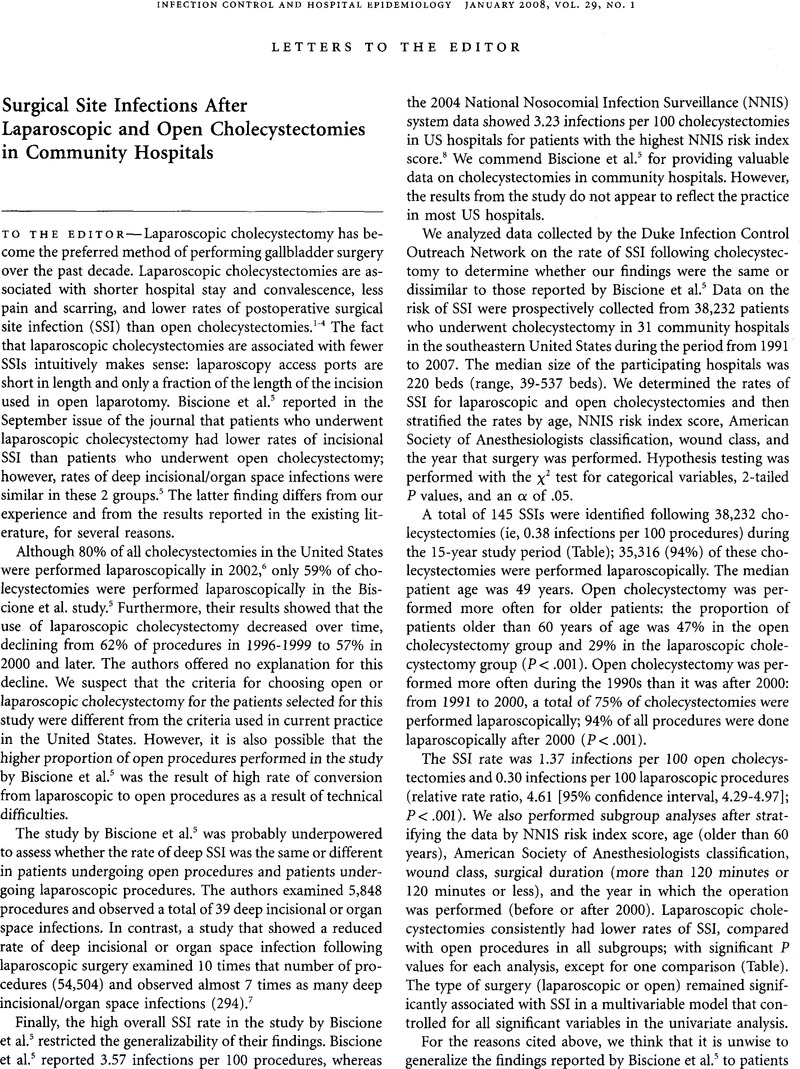Crossref Citations
This article has been cited by the following publications. This list is generated based on data provided by Crossref.
Biscione, Fernando M.
2008.
Reply to Chen et al.
Infection Control & Hospital Epidemiology,
Vol. 29,
Issue. 1,
p.
94.
Knebel, P.
Weigand, M.A.
Büchler, M.W.
and
Seiler, C.M.
2011.
Evidenzbasierte Antibiotikaprophylaxe in der Allgemein- und Viszeralchirurgie.
Der Chirurg,
Vol. 82,
Issue. 3,
p.
227.
Mayhew, Philipp D.
Freeman, Lynetta
Kwan, Toni
and
Brown, Dorothy C.
2012.
Comparison of surgical site infection rates in clean and clean-contaminated wounds in dogs and cats after minimally invasive versus open surgery: 179 cases (2007–2008).
Journal of the American Veterinary Medical Association,
Vol. 240,
Issue. 2,
p.
193.
Hindman, Nicole M.
Kang, Stella
and
Parikh, Manish S.
2014.
Common Postoperative Findings Unique to Laparoscopic Surgery.
RadioGraphics,
Vol. 34,
Issue. 1,
p.
119.
Han, Na Yeon
Sung, Deuk Jae
Park, Beom Jin
Kim, Min Ju
Cho, Sung Bum
and
Kim, Yun Hwan
2014.
Imaging of complications associated with port access of abdominal laparoscopic surgery.
Abdominal Imaging,
Vol. 39,
Issue. 2,
p.
398.
Werra, Carlo de
Aloia, Sergio
Micco, Rosa di
Giudice, Roberto del
Tramontano, Roberto
Mangani, Francesco
Esposito, Ludovica Maria
and
Filippo, Gabriele di
2015.
SSIs in Italy: Prevention and Surveillance during the Last Five Years.
Surgical Science,
Vol. 06,
Issue. 08,
p.
383.
2016.
Krankenhaus- und Praxishygiene.
p.
337.
Warren, David K.
Nickel, Katelin B.
Wallace, Anna E.
Mines, Daniel
Tian, Fang
Symons, William J.
Fraser, Victoria J.
and
Olsen, Margaret A.
2017.
Risk Factors for Surgical Site Infection After Cholecystectomy.
Open Forum Infectious Diseases,
Vol. 4,
Issue. 2,
Radosa, Julia C.
Weiss, Katja
Gabriel, Lena
Radosa, Marc P.
Solomayer, Erich-Franz
and
Juhasz-Böss, Ingolf
2018.
Laparoskopische Eingriffe in der Gynäkologie.
Der Gynäkologe,
Vol. 51,
Issue. 4,
p.
343.
Colling, Kristin P.
Besshoff, Kovi E.
Forrester, Joseph D.
Kendrick, Daniel
Mercier, Phillip
and
Huston, Jared M.
2022.
Surgical Infection Society Guidelines for Antibiotic Use in Patients Undergoing Cholecystectomy for Gallbladder Disease.
Surgical Infections,
Vol. 23,
Issue. 4,
p.
339.
Masaod, Ruba E.
and
Salih, Mugahid A.
2023.
Prevalence and risk factors of post-cholecystectomy surgical site infections.
Annals of Medicine & Surgery,
Vol. 85,
Issue. 11,
p.
5428.



